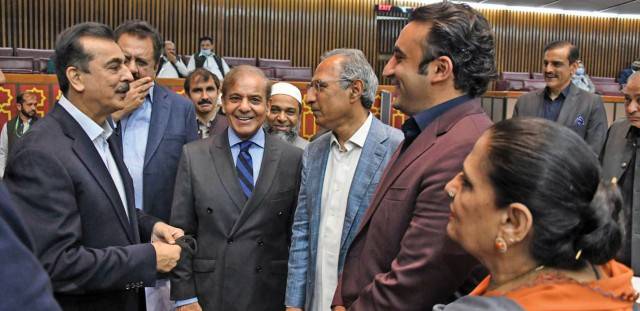
The Senate election results on Wednesday (169 votes for PDM candidate Yousuf Raza Gillani and 164 votes for the PTI alliance candidate Abdul Hafeez Sheikh) has dealt a stunning blow to Imran Khan, setting in motion a process that might turn out to be a game changer.
The PDM decision to participate in by-elections and Senate polls and postpone the long march turned out to be wise, mature and politically correct. Initially, the opposition alliance was very reluctant to participate in the polls. All parties in it, except the PPP, believed that resigning from the Parliament and marching towards Islamabad was the only viable option to bring Imran Khan to heels. Hysterical media hype created a perception that because of its inability to forge a consensus strategy the opposition alliance was on the verge of disintegration.
Participation in the by-elections to a number of national and provincial assemblies’ seats in different parts of the country from Kurram in Khyber Pakhtunkhwa to Daska in the Punjab and Thar in Sindh rattled the ruling coalition as no long march could do. The Daska episode in particular and the decisive and bold action taken by the Election Commission of Pakistan achieved two broad purposes.
One, it exposed that yet again that the self-styled champions of fair play and against corrupt practices were prepared to indulge in any corrupt practice in the book to retain political power. Presiding officers in Daska disappeared in the fog in Punjab, dissident legislators of own party were beaten blue by vigilante brigades inside the Sindh Assembly and the district president of the party in Nowshera sacked in indecent haste without giving him a chance to defend himself.
Two, the by-elections also created a perception - though doubtful and not entirely correct - that by a miracle the deep state had turned neutral. It worked against the government used to the “same page” mantra. This perception, even if misplaced, emboldened those members sitting on the fence in the ruling coalition.
Participation in the democratic process of elections has thus proven to be far more deadly than long marches and dharnas in Islamabad. The credit for this strategy must be given to Asif Ali Zardari. Had the PDM decided to boycott polls, Imran Khan today would have swept elections unopposed, captured parliamentary levers of control and denounced even more vociferously the “corrupt lot.”
In a knee jerk reaction, the prime minister responding to the opposition call to resign with honor, announced to seek a vote of confidence from the National Assembly. The announcement was made without taking his own party’s and alliance parties’ MNAs into confidence. The need for a thought into why his own party legislators voted against him has escaped him.
The Constitution provides that any member voting against party line in the vote of confidence is liable to be disqualified from parliamentary seat. Imran Khan seems to brandish it to warn his party people. However, earlier when Imran Khan brandished veiled threats to dissolve assemblies if PTI members went against him in the Senate polls, it did not work. Brandishing the sword of disqualification instead of taking party legislators into confidence and engaging them in a candid conversation will not go down well with many. An upset therefore is not unlikely.
The next crucial step is the election to the office of chairman of Senate. With 21 seats in the Senate, the Pakistan People’s Party has emerged the largest among the opposition parties in the Upper House. Chairman Bilawal Bhutto Zardari has already announced to field Yousuf Raza Gilani as party candidate for the office of chairman.
Regardless of who from among the opposition parties becomes the chairman, one thing is clear: in the event of the opposition in majority and the Senate also controlled by it, Imran Khan, known for knee jerk reactions instead of calculated political moves, will not be able to function effectively. He is likely to make blunders and hasten his downfall.

Those in the PTI who have been protesting against the ‘unelected’ ministers and advisors have tasted blood in the March 3 polls. Their demand to show the door to unelected advisors will gain momentum. Imran Khan, who has placed his trust in unelected advisors, can ignore them only at his peril. In the senate elections he was forced to refuse party tickets to unelected advisors but that has proven to be too little too late.
The ordinance that allowed Hafeez Sheikh to become minister of finance will expire in June this year. With an opposition-dominated Senate, headed also by it, there is no way for Hafeez Sheikh to continue as minister beyond June. Even if he stays on as an unelected advisor, he will not be able to chair meetings of the National Finance Commission or the Economic Coordination Committee. Imran Khan and his selectors both will be forced to find his replacement. With the swords of IMF and FATF hanging on the one hand and huge challenges of economic revival on the other, bringing in the previous economic team that was shown the door will not help either. The “same page” will be torn up further.
A week from now, on March 12, chairman and deputy chairman of the Senate will be elected. History records how the month of March witnessed the end of Julius Caesar. A month before he was murdered, a soothsayer warned Julius Caesar to beware of the dangers to his life in the next 30 days. Beware of the ‘Ides of March,’ he had warned. Exactly a month on the Ides of March (the 15th), 44BC Julius Caesar was murdered by a group of Roman senators.
The countdown for Imran Khan may have already begun in March. Beware of the Ides of March.
The writer is a former senator
The PDM decision to participate in by-elections and Senate polls and postpone the long march turned out to be wise, mature and politically correct. Initially, the opposition alliance was very reluctant to participate in the polls. All parties in it, except the PPP, believed that resigning from the Parliament and marching towards Islamabad was the only viable option to bring Imran Khan to heels. Hysterical media hype created a perception that because of its inability to forge a consensus strategy the opposition alliance was on the verge of disintegration.
Participation in the by-elections to a number of national and provincial assemblies’ seats in different parts of the country from Kurram in Khyber Pakhtunkhwa to Daska in the Punjab and Thar in Sindh rattled the ruling coalition as no long march could do. The Daska episode in particular and the decisive and bold action taken by the Election Commission of Pakistan achieved two broad purposes.
One, it exposed that yet again that the self-styled champions of fair play and against corrupt practices were prepared to indulge in any corrupt practice in the book to retain political power. Presiding officers in Daska disappeared in the fog in Punjab, dissident legislators of own party were beaten blue by vigilante brigades inside the Sindh Assembly and the district president of the party in Nowshera sacked in indecent haste without giving him a chance to defend himself.
Two, the by-elections also created a perception - though doubtful and not entirely correct - that by a miracle the deep state had turned neutral. It worked against the government used to the “same page” mantra. This perception, even if misplaced, emboldened those members sitting on the fence in the ruling coalition.
Participation in the democratic process of elections has thus proven to be far more deadly than long marches and dharnas in Islamabad. The credit for this strategy must be given to Asif Ali Zardari. Had the PDM decided to boycott polls, Imran Khan today would have swept elections unopposed, captured parliamentary levers of control and denounced even more vociferously the “corrupt lot.”
In a knee jerk reaction, the prime minister responding to the opposition call to resign with honor, announced to seek a vote of confidence from the National Assembly. The announcement was made without taking his own party’s and alliance parties’ MNAs into confidence. The need for a thought into why his own party legislators voted against him has escaped him.
Those in the PTI who have been
protesting against the ‘unelected’ ministers and advisors have tasted blood in the
March 3 polls
The Constitution provides that any member voting against party line in the vote of confidence is liable to be disqualified from parliamentary seat. Imran Khan seems to brandish it to warn his party people. However, earlier when Imran Khan brandished veiled threats to dissolve assemblies if PTI members went against him in the Senate polls, it did not work. Brandishing the sword of disqualification instead of taking party legislators into confidence and engaging them in a candid conversation will not go down well with many. An upset therefore is not unlikely.
The next crucial step is the election to the office of chairman of Senate. With 21 seats in the Senate, the Pakistan People’s Party has emerged the largest among the opposition parties in the Upper House. Chairman Bilawal Bhutto Zardari has already announced to field Yousuf Raza Gilani as party candidate for the office of chairman.
Regardless of who from among the opposition parties becomes the chairman, one thing is clear: in the event of the opposition in majority and the Senate also controlled by it, Imran Khan, known for knee jerk reactions instead of calculated political moves, will not be able to function effectively. He is likely to make blunders and hasten his downfall.

Those in the PTI who have been protesting against the ‘unelected’ ministers and advisors have tasted blood in the March 3 polls. Their demand to show the door to unelected advisors will gain momentum. Imran Khan, who has placed his trust in unelected advisors, can ignore them only at his peril. In the senate elections he was forced to refuse party tickets to unelected advisors but that has proven to be too little too late.
The ordinance that allowed Hafeez Sheikh to become minister of finance will expire in June this year. With an opposition-dominated Senate, headed also by it, there is no way for Hafeez Sheikh to continue as minister beyond June. Even if he stays on as an unelected advisor, he will not be able to chair meetings of the National Finance Commission or the Economic Coordination Committee. Imran Khan and his selectors both will be forced to find his replacement. With the swords of IMF and FATF hanging on the one hand and huge challenges of economic revival on the other, bringing in the previous economic team that was shown the door will not help either. The “same page” will be torn up further.
A week from now, on March 12, chairman and deputy chairman of the Senate will be elected. History records how the month of March witnessed the end of Julius Caesar. A month before he was murdered, a soothsayer warned Julius Caesar to beware of the dangers to his life in the next 30 days. Beware of the ‘Ides of March,’ he had warned. Exactly a month on the Ides of March (the 15th), 44BC Julius Caesar was murdered by a group of Roman senators.
The countdown for Imran Khan may have already begun in March. Beware of the Ides of March.
The writer is a former senator

